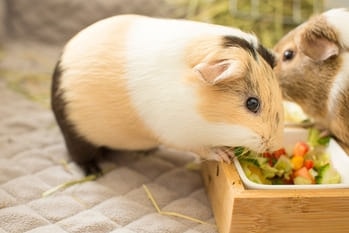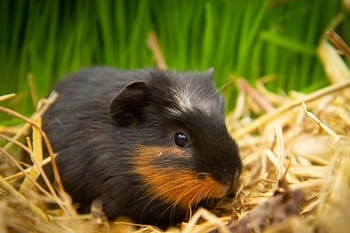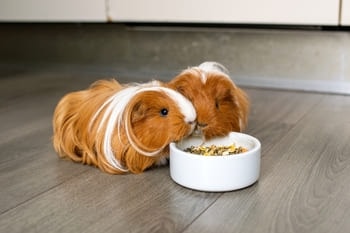Guinea pigs are delightful, social small mammals that bring joy and companionship to many households. However, as with any pet, there are times when they may exhibit concerning behaviors, such as a sudden loss of appetite. If you ask, “Why is my guinea pig not eating?” you’re not alone. This blog delves deep into the potential reasons behind this behavior, how to address it, and preventive measures to ensure your guinea pig remains healthy and happy.
Understanding Guinea Pig Eating Habits
Before discussing the causes of guinea pigs’ inability to eat, it’s essential to understand their normal eating patterns. Guinea pigs are herbivores with a digestive system designed to process a diet high in fiber. They require a healthy diet consisting of fresh hay, vegetables, and a limited amount of pellets. Their teeth continuously grow, so consistent chewing on fibrous materials is crucial to prevent dental issues.
Importance of a Balanced Diet
A balanced diet ensures that guinea pigs receive all the nutrients to thrive. Fresh hay, such as Timothy hay, should make up most of their diet, providing the fiber necessary for proper digestion. Vegetables rich in vitamin C are also vital, as guinea pigs cannot synthesize this vitamin alone. Additionally, fresh water should always be available through a water bottle or a suitable drinking method.
Common Reasons Why Your Guinea Pig Isn’t Eating
Several factors can lead to a guinea pig refusing to eat. Understanding these can help you identify the issue and take appropriate action.
1. Stress-Free Environment
 Guinea pigs are sensitive to their surroundings. Environmental changes, such as moving to a new home, introducing new pets, or loud noises, can cause stress. A stressed guinea pig may stop eating in response to the unsettling environment. Ensuring a stress-free environment with consistent routines can help alleviate this issue.
Guinea pigs are sensitive to their surroundings. Environmental changes, such as moving to a new home, introducing new pets, or loud noises, can cause stress. A stressed guinea pig may stop eating in response to the unsettling environment. Ensuring a stress-free environment with consistent routines can help alleviate this issue.
2. Dental Issues
Dental problems are a common cause of a guinea pig stopping eating. Their teeth grow continuously, and chewing becomes painful if they develop overgrown or misaligned teeth. Signs include drooling, weight loss, and a reluctance to eat. Regular check-ups with a veterinarian can help detect and address dental issues early.
3. Digestive System Disorders
Guinea pigs have a delicate digestive system, and any imbalance can lead to problems like gi stasis, where the digestive process slows down or stops. Causes can include a sudden change in diet, lack of fiber, or ingesting non-food items. Symptoms include a bloated abdomen, lethargy, and reduced fecal output.
4. Health Issues
Various health issues can cause a guinea pig not to eat. Liver problems, respiratory infections, or urinary tract issues can reduce their appetite. It’s crucial to monitor other symptoms, such as changes in behavior, appearance, or bodily functions, and seek veterinary care promptly.
5. Dietary Changes
Sudden or improper dietary changes can upset a guinea pig’s stomach. Introducing new foods too quickly or providing foods high in sugar or lacking in fiber can lead to digestive issues and a lack of appetite. Transitioning to new foods gradually is essential to prevent this.
6. Age-Appropriate Needs
As guinea pigs age, their dietary needs may change. Older guinea pigs might have decreased appetite due to slower metabolism or age-related health issues. Ensuring their diet meets their changing nutritional needs is vital for maintaining their health.
7. Hydration Issues
Adequate drinking water is essential for a guinea pig’s health. Dehydration can lead to a lack of appetite and other severe health problems. Ensure that your guinea pig has constant access to fresh water, and monitor their water intake regularly.
Signs Your Guinea Pig Isn’t Eating
Recognizing the signs that your guinea pig isn’t eating is the first step toward addressing the problem. Common indicators include:
- Weight Loss: A noticeable decrease in weight is a significant sign of reduced food intake.
- Lethargy: A lack of energy or enthusiasm to move around can indicate health issues.
- Poor Coat Condition: A healthy guinea pig has a smooth coat. Dullness or patchiness may suggest nutritional deficiencies.
- Changes in Fecal Output: Reduced or abnormal feces can indicate digestive problems.
- Hunched Posture: Guinea pigs may adopt a hunched stance when in pain or discomfort.
If you observe any of these signs, acting swiftly to prevent further complications is crucial.
What to Do If Your Guinea Pig Stops Eating
If your guinea pig refuses to eat, consider the following steps to address the issue:
1. Assess the Environment
 Ensure that your guinea pig’s living area is calm and free from stressors. Remove any new pets, reduce loud noises, and provide hiding spots where they can feel safe. A stress-free environment can encourage your guinea pig to resume normal eating habits.
Ensure that your guinea pig’s living area is calm and free from stressors. Remove any new pets, reduce loud noises, and provide hiding spots where they can feel safe. A stress-free environment can encourage your guinea pig to resume normal eating habits.
2. Evaluate Their Diet
Review the foods you’re offering. Ensure your guinea pig can access fresh hay, vegetables, and appropriate pellets. Avoid sudden dietary changes and introduce new foods gradually. Providing a healthy diet rich in fiber can stimulate appetite and maintain digestive health.
3. Check for Dental Problems
Examine your guinea pig’s mouth for signs of dental issues, such as overgrown teeth or difficulty chewing. If you suspect dental problems, contact a veterinarian immediately for a professional evaluation and treatment.
4. Monitor Hydration
Ensure your guinea pig is drinking enough water. Check the water bottle for functionality and cleanliness. If your guinea pig isn’t drinking, you may need to offer water through alternative methods or consult a veterinarian.
5. Provide a Balanced Diet
A balanced diet is crucial for preventing and addressing appetite issues. Incorporate a variety of fresh vegetables, high-quality hay, and limited pellets to ensure your guinea pig receives all necessary nutrients, including vitamin C.
6. Handle Health Issues Promptly
If your guinea pig is exhibiting other symptoms like lethargy, weight loss, or changes in fecal output, seek veterinary care immediately. Early intervention can prevent severe complications and improve the chances of recovery.
7. Consider Syringe Feeding
In cases where your guinea pig refuses to eat but remains alert and hydrated, syringe feeding may be necessary to provide essential nutrients. This method should be done under the guidance of a veterinarian to ensure proper technique and prevent aspiration.
8. Hand Feeding
For a sick guinea pig, feeding it soft foods can encourage eating. Offer pureed vegetables or specially formulated soft pellets to make consumption easier and more appealing.
Preventing Appetite Issues in Guinea Pigs
Prevention is always better than cure. Here are some strategies to ensure your guinea pig maintains a healthy appetite:
1. Maintain a Consistent Routine
Guinea pigs thrive on routine. Consistent feeding times and environments can reduce stress and promote regular eating habits.
2. Provide Plenty of Hay
Ensuring unlimited access to fresh hay helps maintain dental health and provides necessary fiber for digestion. Fresh hay also stimulates natural chewing behaviors, keeping their teeth at the proper length.
3. Introduce a Variety of Foods
Offering a range of vegetables and fruits can prevent boredom and ensure a balanced diet. Rotate foods regularly to provide different flavors and nutrients.
4. Regular Health Check-Ups
Periodic visits to the veterinarian can help catch and address health issues before they lead to a loss of appetite. Regular check-ups are especially important as your guinea pig ages.
5. Monitor Their Weight and Health
Regularly weigh your guinea pig and observe their behavior and appearance. Early detection of weight loss or other health changes can prompt timely intervention.
6. Ensure Proper Hydration
Always provide access to clean, fresh water. Check the water bottle regularly to ensure it’s functioning correctly, and replace it as needed.
7. Create a Safe Living Space
A clean, spacious, and enriched living environment can reduce stress and promote well-being, encouraging your guinea pig to eat regularly.
Addressing Specific Health Issues
Certain health conditions require targeted approaches to restore your guinea pig’s appetite.
Dental Problems
If your guinea pig has dental issues, a veterinarian may need to trim overgrown teeth or address misalignments. Providing soft foods and ensuring they can eat without pain during recovery is essential.
Gi Stasis
Gi stasis is a life-threatening condition that requires immediate veterinary attention. Treatment often involves syringe feeding to provide necessary nutrients while addressing the underlying cause. Maintaining a high-fiber diet with plenty of hay can help prevent this condition.
Liver Problems
Liver problems can significantly impact your guinea pig’s appetite. Symptoms include jaundice (yellowing of the skin and eyes), lethargy, and weight loss. Veterinary intervention is crucial to manage and treat liver-related issues.
Importance of Vitamin C
Guinea pigs cannot synthesize vitamin C, making it a critical diet component. A deficiency can lead to scurvy, characterized by lethargy, joint pain, and poor coat condition. Ensure your guinea pig receives adequate vitamin C through fresh vegetables like bell peppers, kale, broccoli, or specially formulated supplements.
Recognizing When It’s an Emergency
 In some cases, a guinea pig not eating is an emergency. If your guinea pig stops eating for more than 24 hours, especially if accompanied by other symptoms like lethargy, bloating, or difficulty breathing, seek immediate veterinary care. Early intervention can differentiate life and death for your small mammal friend.
In some cases, a guinea pig not eating is an emergency. If your guinea pig stops eating for more than 24 hours, especially if accompanied by other symptoms like lethargy, bloating, or difficulty breathing, seek immediate veterinary care. Early intervention can differentiate life and death for your small mammal friend.
Creating a Supportive Environment
A supportive and enriching environment is vital to your guinea pig’s health and appetite.
1. Proper Housing
Ensure your guinea pig’s cage is spacious, clean, and equipped with hiding spots. A comfortable living space reduces stress and encourages natural behaviors, including eating.
2. Social Interaction
Guinea pigs are social creatures. Regular interaction and companionship can prevent loneliness and stress, promoting a healthy appetite.
3. Mental Stimulation
Provide toys, tunnels, and chew items to stimulate your guinea pig mentally. Engaging in activities can reduce stress and promote overall well-being.
Long-Term Care and Maintenance
Maintaining your guinea pig’s health over the long term involves consistent care and attention to their needs.
1. Regular Feeding Schedule
Establish and maintain a consistent feeding schedule. Regularity helps regulate their digestive system and encourages consistent eating habits.
2. Clean Living Environment
Regularly clean the cage to prevent the buildup of waste and bacteria. A clean environment promotes health and reduces the risk of infections that can lead to a loss of appetite.
3. Monitor for Changes
Stay vigilant for changes in your guinea pig’s behavior, appearance, or eating patterns. Early detection of issues allows for prompt intervention.
4. Provide Fresh Foods Daily
Ensure your guinea pig has daily access to fresh hay, vegetables, and clean water. Rotating their diet helps prevent boredom and ensures a balanced intake of nutrients.
When to Seek Professional Help
While many issues can be addressed at home, some require professional assistance.
Persistent Appetite Loss
If your guinea pig refuses to eat for more than a day despite your efforts to improve its environment and diet, consult a veterinarian.
Severe Symptoms
Symptoms like extreme weight loss, difficulty breathing, or visible pain warrant immediate veterinary attention.
Uncertain Diagnosis
If you’re unsure about the cause of your guinea pig’s appetite loss, a veterinarian can provide a proper diagnosis and treatment plan.
Conclusion
Understanding why your guinea pig is not eating is crucial for their health and well-being. Recognizing the signs, identifying potential causes, and taking proactive steps will ensure your guinea pig remains healthy and happy. Remember, losing appetite can indicate underlying health issues requiring professional attention. Maintaining a balanced diet, providing a stress-free environment, and ensuring regular veterinary care are essential components of responsible guinea pig ownership.
Your guinea pig relies on you to monitor their health and respond to their needs promptly. By staying informed and attentive, you can address issues before they escalate, ensuring your small mammal friend enjoys a long, healthy life filled with joy and companionship.
Frequently Asked Questions (FAQs)
1. How quickly can a guinea pig recover from not eating?
Recovery time varies depending on the underlying cause. Minor issues like temporary stress may resolve within a day or two, while more severe health problems require longer treatment periods under veterinary care.
2. Can I force-feed my guinea pig if it stops eating?
Force-feeding should only be done under the guidance of a veterinarian. Improper technique can cause choking or aspiration pneumonia.
3. What are the best foods to encourage a guinea pig to eat?
Fresh hay, crisp vegetables like bell peppers and cucumbers, and high-quality pellets are excellent choices. Offering a variety can stimulate their appetite.
4. How often should I take my guinea pig to the vet?
Regular check-ups are recommended at least once a year, with more frequent visits for older guinea pigs or those with health issues.
5. Is weight loss always a sign of a problem?
Unexplained weight loss is often a sign of an underlying issue and should be addressed promptly by a veterinarian.
You can ensure they lead a healthy, fulfilling life by staying informed and attentive to your guinea pig’s needs. Always seek professional veterinary advice to safeguard your pet’s well-being when in doubt.
References
https://www.ncbi.nlm.nih.gov/pmc/articles/PMC7171464/
https://www.petmd.com/exotic/conditions/digestive/c_ex_gp_appetite_loss
https://www.ncbi.nlm.nih.gov/books/NBK231932/




